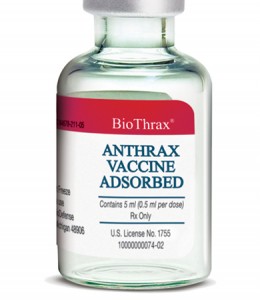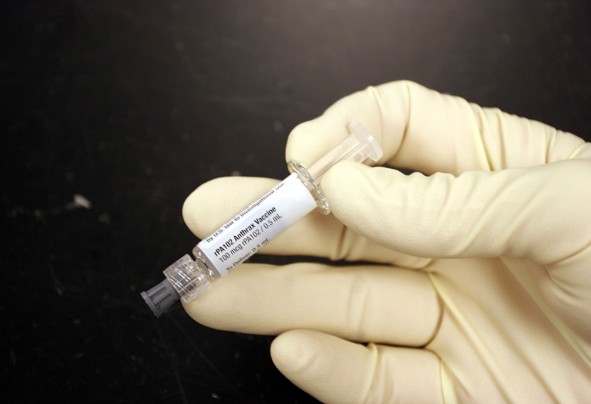Anthrax Vaccine Trial Ethics? Science?

The Obama administration continues to push for approval of a highly controversial, ethically untennable experiment to test the safety and efficacy of the Anthrax Vaccine Adsorbed on children. When discussed at a recent meeting of the Presidential Commission for the Study of Bioethical Issues (May 17, 2012), it was apparant that the Commission had not been provided with any factual evidence–from the adult safety / efficacy data–to support such an radical departure from ethical principles that–at the very least–require strong justification for putting any children at risk of any potential harm inasmuch as there is no direct benefit for the children who would be used as guinea pigs.
The likely explanation for the failure to provide the commission with data that might support a pediatric anthrax vaccine trial, is the fact that there is no favorable efficacy data. Indeed, the only direct human efficacy study for a US manufactured anthrax vaccine was conducted in the 1950s at 4 goat hair mills by Philip Brachman MD for the Army and the Centers for Disease Control. [1] His study demonstrated efficacy for cutaneous anthrax but not inhalation anthrax–and the vaccine differed significantly fromn the one used today. There is no demonstrable data for the vaccine’s efficacy against inhallation anthrax.
The anthrax vaccine is a highly contentious one because of its documented severe adverse neuro
The claimed findings in several safety studies carried out by Cdolonel John Grabenstein, PhD, who oversaw the military vaccine program, are suspect because Dr. Grabenstein who is a member of the National Biodefense Science Board, had and continues to have a significant financial conflict of interest in promoting the claim that the vaccine is safe. Dr. Grabenstein has been a consultant for several vaccine companies and is currently employed by Merck, which produced anthrax vaccine for the US government in the 1960s and is today a major US vaccine manufacturer.
In her detailed, fact-filled, fully referenced commentary subitted to the Commisison in January 2012, Meryl Nass, MD , provided compelling arguments against the exposure of children to the serious risks of the anthrax vaccine. Dr. Nass points out that “a 1998-2000 study was designed to use active surveillance for long-term side effects and to determine their duration, according to principal investigator Colonel Glenn Wasserman. [2] But when the study was published in 2003, with Colonel Grabenstein as second author, information on prolonged or late onset adverse events was not disclosed. Eleven women who had been vaccinated while pregnant, mentioned by Wasserman in oral presentations, failed to be mentioned in the published paper. Half the subjects were lost to follow-up by the end of the study. The exit questionnaire was not designed to capture specific information about vaccine-related adverse events and their duration, and did not mention anthrax vaccine.”
Furthermore, "CDC conducted a multicenter trial of Biothrax in 1563 subjects, 83% of whom received anthrax vaccine, between 2002 and 2007. Two hundred twenty-nine serious adverse event reports were filed with the federal Vaccine Adverse Event Reporting System during the 43-month trial. About 12% of subjects experienced a serious [3] adverse event. But only a preliminary report on the first seven months and first 1000 subjects in the trial was published, in 2008. [4] There has been no final report, nor any publicly available accounting of these adverse events."
These facts, coupled with the uneasy question– Whose children will be subjected as involuntary experimental subjects in an anthrax vaccine trial?–should result in a resounding rejection of the proposed trial by the Presidential Commission for the Study of Bioethical Issues.
References
1. Brachman PS, Gold H, Plotkin SA, Fekety FR, Werrin M and Ingraham NR. Field Evaluation of a Human Anthrax Vaccine. Am J Public Health 1962; 52(4): 632-645.
2. Wasserman G. Tripler Army Medical Center Survey. First Annual Department of Defense Conference for Biological Warfare Defense Immunizations. May 26, 1999. Fort Detrick, Maryland. Transcript.
3. http://www.fda.gov/safety/medwatch/howtoreport/ucm053087.htm
4.Marano M, Plikaytis BD, Martin SW et al. Effects of a Reduced Dose Schedule and Intramuscular Administration of Anthrax Vaccine Adsorbed on Immunogenicity and Safety at 7 Months. JAMA 2008; 300(13): 1532-1543
Nature News Blog
Anthrax vaccine trial meets bioethicists
An anthrax vaccine would protect civilians from the long-term effects of a bioterrorist attack. But there’s no telling how children would react to the shots.
To assess the ethics of a trial, in which kids would get an anthrax vaccine unlikely to ever be necessary, a federal committee met today in Washington, D.C.
“The chance that we would have a widespread outbreak of anthrax are relatively low, but if anthrax were weaponized, it would be catastrophic,” explains Larry Gostin, of the O’Neill Institute Center on Public Health Law & Human Rights in Washington, D.C. “From a public health perspective, it’s right to think about the best way to prevent these hazards.”
The Presidential Commission for the Study of Bioethical Issues is expected to finalize their decision by early next year. Their task follows a vote in favor of a pediatric anthrax vaccine trial by the U.S. National Biodefense Science Board in October, who in turn had been asked for an opinion by the U.S. Department of Health and Human Services (HHS).
Momentum for a trial began after the worrisome results of a doomsday “exercise” designed to test how the country would react to an immense release of anthrax spores in San Francisco. The project, called Dark Zephyr, found that 7.6 million people — including 1.7 million individuals under age 18 — would need to be vaccinated.
Regardless of a clinical trial, teens and children would immunized if disaster struck because the shots have proven safe in some 1.2 million vaccinated adults in the military, says Major General John Parker, the chair of the National Biodefense Science Board. Among other things, a trial would let clinicians know how much vaccine to give, he says.
Children complicate clinical trials, ethically speaking, because participants ought to fully grasp the risks and purposes of a trial prior to enrolling, and kids often do not. Other concerns voiced at the meeting included the fact that a pediatric anthrax vaccine trial is unlikely yield direct benefits to participants because there’s little chance of an anthrax attack, and an even smaller chance of an attack near the locale where the trial ensued.
Amy Gutmann, the chair of the bioethical issues commission, says a strong case for the study would be made “if the community that’s most supportive of moving this forward would volunteer their own children for the study.” Parker responded to the comment: “There are people in our population [the armed forces] that would like their family immunized.”
Some experts weren’t swayed by the putative pay-off of a trial. Nicola Klein, co-director at Kaiser Permanente Vaccine Study Center, says she’s not convinced that anthrax is currently a credible threat. And Robert “Skip” Nelson, a pediatric ethicist at the US Food and Drug Administration, questions the need for a pre-emptive trial as opposed to one after a catastrophe hits. After all, people would take 60-days of antibiotics to ward off the immediate effects of an anthrax attack, while the vaccine would provide protection going forward. “If the argument is that a pre-event study is better,” he says, “I need to know the science behind why that is”
HHS Secretary Kathleen Sebelius illustrated the gravity of the dilemma by voicing her appreciation for the bioethics commission and the experts at the meeting. “Your work is critically important to the 300 million people or so who are not in the room today,” she says. “And I thank you on their behalf because your work effects their lives whether they know it or not.”
~~~~~~~~~~~~~~~~~~~~~~
LAURAN NEERGAARD

WASHINGTON — The Obama administration is asking a presidential commission to help decide an ethical quandary: Should the anthrax vaccine and other treatments being stockpiled in case of a bioterror attack be tested in children?
"We can’t just assume that what we have for adults works for children," Health and Human Services Secretary Kathleen Sebelius told the panel Thursday.Controversy over whether to open pediatric studies of the anthrax vaccine led Sebelius to ask the Presidential Commission for the Study of Bioethical Issues to tackle the question. The commission began its deliberations Thursday; recommendations are expected by year’s end.
Sebelius made clear that the question is far broader than anthrax.
"There are serious ethical issues around the development of medical countermeasures for children" in general, she said.
Developing protections for youngsters is critically important, but in a way that puts "our children’s safety as our highest priority," Sebelius said.
A decade after the anthrax attacks in the United States, the government has a multibillion-dollar stockpile of tools to fight back against some of the threats that worry defense experts. Notably missing is information on how to treat children in various emergencies — whether the same drugs their parents will get will work or be safe for them, and even what dose youngsters should receive.
Thus the debate on whether to conduct studies now, before millions of children might need to try an untested product in an emergency. Even if those studies were offered, there’s no way to know how many parents would agree to enroll their children.
Testing medications in children always requires extra safeguards. It’s fairly straightforward to test a potential treatment for cancer or some other childhood disease. But if a child won’t receive a direct medical benefit, federal regulations say studies are allowed only if testing adults can’t provide the answers and if the risks to participating children are minimal.
Anyone exposed during an anthrax attack would require 60 days of powerful antibiotics, or antibiotics until a vaccine could kick in. Last fall, the National Biodefense Safety Board, which advises the government, recommended child testing of the anthrax vaccine, but only if outside ethical experts agreed such studies could be done appropriately.
The shots have been widely used in adults, including U.S. troops, and are considered safe for them, said the board chairman, Dr. John Parker, a retired Army major general who has been vaccinated.
Side effects include shot-site soreness and redness, muscle aches, fatigue and headache. Rare but serious allergic reactions have been reported.
The bioethics commission wrestled with how to define "minimal risk" when there is no imminent emergency, and the chairwoman, Dr. Amy Gutmann, wondered whether people urging such testing would enroll their own children.
Parker responded that he’s discussed that with first-responders and some in the military. "There are groups out there that would want their families protected as much as they are protected as they do their job, in fear of bringing something home," he said.
Other doctors told the panel that 60 days of antibiotics can cause bad side effects for children, including diarrhea, other infections and dangerous allergic reactions. Plus there’s concern that many people wouldn’t take the full course, Parker said.
Bioethicist Art Caplan, a frequent msnbc.com contributor, believes that the point is actually moot.
"The notion that parents are going to sign up their children for a study of anthrax vaccine that involves as many as seven shots is somethere between dreaming and ridiculous," said Caplan, director for the Center for Biothethics at the University of Pennsylvania.
"I think this is an exercise in utter futility," added Caplan, who is the incoming director of medical ethics at NYU Langone Medical Center.
Copyright 2012 The Associated Press. All rights reserved.



